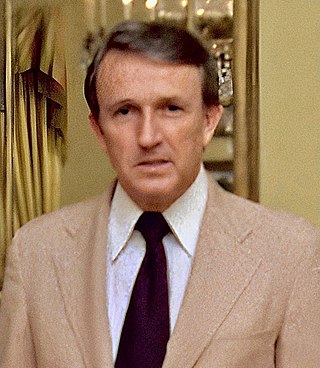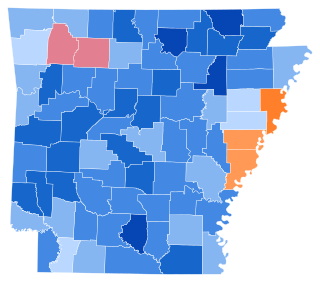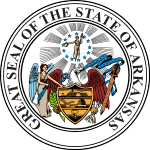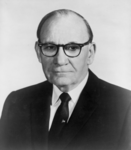
A Presidential election was held in the United States on November 4, 1952. Republican nominee Dwight D. Eisenhower defeated Democratic Illinois Governor Adlai Stevenson II in a landslide victory, becoming the first Republican president in 20 years. This was the first election since 1928 without an incumbent president on the ballot.

Fielding Lewis Wright was an American politician who served as the 19th lieutenant governor and 49th and 50th governor of Mississippi. During the 1948 presidential election he served as the vice presidential nominee of the States' Rights Democratic Party (Dixiecrats) alongside presidential nominee Strom Thurmond. During his political career he fought to maintain racial segregation, fighting with President Harry S. Truman over civil rights legislation, and holding other racist views.

Orval Eugene Faubus was an American politician who served as the 36th Governor of Arkansas from 1955 to 1967, as a member of the Democratic Party. In 1957, he refused to comply with a decision of the U.S. Supreme Court in the 1954 case Brown v. Board of Education, and ordered the Arkansas National Guard to prevent black students from attending Little Rock Central High School. This event became known as the Little Rock Crisis. He was elected to six two-year terms as governor.

Dale Leon Bumpers was an American lawyer and politician who served as the 38th Governor of Arkansas (1971–1975) and in the United States Senate (1975–1999). He was a member of the Democratic Party. He was counsel at the Washington office of law firm Arent Fox LLP, where his clients included Riceland Foods and the University of Arkansas for Medical Sciences.

Sidney Sanders McMath was a U.S. marine, attorney and the 34th governor of Arkansas from 1949 to 1953. In defiance of his state's political establishment, he championed rapid rural electrification, massive highway and school construction, the building of the University of Arkansas for Medical Sciences, strict bank and utility regulation, repeal of the poll tax, open and honest elections and broad expansion of opportunity for black citizens in the decade following World War II.

Homer Martin Adkins was an American businessman and Democratic politician who served as the 32nd Governor of Arkansas. Adkins is remembered as a skilled retail politician and a strong states' rights proponent and social conservative who served as governor during a period when Arkansas departed from several national economic and societal trends. The Adkins administration fought federal influence in Arkansas during the post-New Deal era; successfully courting federal wartime production investment, during World War II, while battling the federal resettlement of Japanese-Americans in the state and Supreme Court civil rights decisions.

John Little McClellan was an American lawyer and segregationist politician. A member of the Democratic Party, he served as a U.S. Representative (1935–1939) and a U.S. Senator (1943–1977) from Arkansas.

Wayne Lyman Morse was an American attorney and United States Senator from Oregon. Morse is well known for opposing the Democratic Party’s leadership and for his opposition to the Vietnam War on constitutional grounds.

The 1966 United States Senate elections were elections on November 8, 1966, for the United States Senate which occurred midway through the second term of President Lyndon B. Johnson. The 33 seats of Class 2 were contested in regular elections. Special elections were also held to fill vacancies. With divisions in the Democratic base over the Vietnam War, and with the traditional mid-term advantage of the party not holding the presidency, the Republicans took three Democratic seats, thereby breaking Democrats' 2/3rds supermajority. Despite Republican gains, the balance remained overwhelmingly in favor of the Democrats, who retained a 64–36 majority. Democrats were further reduced to 63–37, following the death of Robert F. Kennedy in June 1968.

The 1960 United States Senate elections coincided with the election of John F. Kennedy as president on November 8, 1960. The 33 seats of Class 2 were contested in regular elections. A special election was also held on June 28, 1960, for a mid-term vacancy in North Dakota where Democrats flipped a seat to expand their majority to 66–34. As Majority Leader Lyndon Johnson was elected Vice President, Mike Mansfield became the new majority leader.
Henry Woods was a United States district judge of the United States District Court for the Eastern District of Arkansas.

The 1958 United States Senate election in Utah was held on November 4, 1958.

The 1996 United States Senate election in Arkansas was held on November 5, 1996. Incumbent Democratic U.S. Senator David Pryor decided to retire. Republican Tim Hutchinson won the open seat, becoming the first Republican to win a U.S. Senate seat in Arkansas since Reconstruction in 1872 and the first to ever be popularly elected in the state. He was the first to win this seat since 1870. Hutchinson lost re-election in 2002 to David Pryor's son Mark Pryor.

The 1980 United States Senate election in Arkansas was held on November 4, 1980. Incumbent Democratic U.S. Senator Dale Bumpers won re-election to a second term. This election was Bumpers's closest election in his senatorial career.

The 1952 United States Senate election in Arizona was held on November 4, 1952. Incumbent Democratic U.S. Senator and Senate Majority Leader Ernest McFarland ran for re-election to a third term, but was defeated by the Republican nominee and future candidate for President of the United States, Barry Goldwater.

The 1966 United States Senate election in Arkansas took place on November 8, 1966. Incumbent U.S. Senator John L. McClellan was re-elected to a fifth term in office.

The 1972 United States Senate election in Arkansas took place on November 7, 1972. Incumbent U.S. Senator John L. McClellan was re-elected to a sixth term in office, defeating U.S. Representative David Pryor in a hotly contested primary. In the general election, McClellan easily defeated Republican physician Wayne Babbitt. This was McClellan's final campaign; he died in his sleep in 1977. Pryor was elected Governor of Arkansas in 1974 and won the race to succeed McClellan in 1978.

The 1948 United States presidential election in Arkansas took place on November 2, 1948, as part of the 1948 United States presidential election. State voters chose nine representatives, or electors, to the Electoral College, who voted for president and vice president. This would be the last presidential election where Arkansas had nine electoral votes: the Great Migration would see the state lose three congressional districts in the next decade-and-a-half.

The 1954 Arkansas gubernatorial election was held on November 2, 1954.

The 1952 Arkansas gubernatorial election was held on November 4, 1952.





















